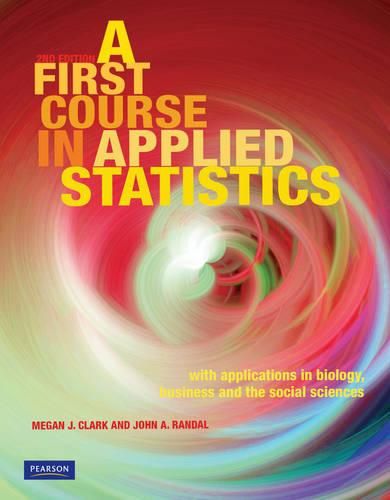Readings Newsletter
Become a Readings Member to make your shopping experience even easier.
Sign in or sign up for free!
You’re not far away from qualifying for FREE standard shipping within Australia
You’ve qualified for FREE standard shipping within Australia
The cart is loading…






A First Course in Applied Statistics by Megan J. Clark and John A. Randal, now in its second edition, is specifically tailored to the needs of biology, business and social science students and is designed to equip them with the statistical skills and knowledge that will allow them to advance in their chosen discipline. The exercises which support the text are all based on recent real-world applications. Data are sourced from reports and articles written by academics and practitioners in psychology, ecology, marine biology, business, finance, economics, computing, biomedical science and environmental science, making this book relevant to current developments in these disciplines. The book has a strong local flavour with many high interest examples reflecting New Zealand and its academic community. Many exercises place New Zealand society within a global context. Others reflect research specific to New Zealanders, or by New Zealand academics, to emphasise to students the immediate relevance and applicability of this material to the student’s major course of study.
$9.00 standard shipping within Australia
FREE standard shipping within Australia for orders over $100.00
Express & International shipping calculated at checkout
A First Course in Applied Statistics by Megan J. Clark and John A. Randal, now in its second edition, is specifically tailored to the needs of biology, business and social science students and is designed to equip them with the statistical skills and knowledge that will allow them to advance in their chosen discipline. The exercises which support the text are all based on recent real-world applications. Data are sourced from reports and articles written by academics and practitioners in psychology, ecology, marine biology, business, finance, economics, computing, biomedical science and environmental science, making this book relevant to current developments in these disciplines. The book has a strong local flavour with many high interest examples reflecting New Zealand and its academic community. Many exercises place New Zealand society within a global context. Others reflect research specific to New Zealanders, or by New Zealand academics, to emphasise to students the immediate relevance and applicability of this material to the student’s major course of study.